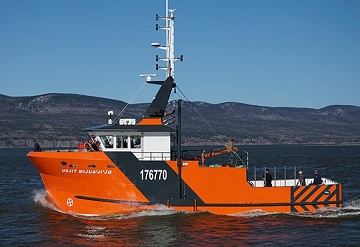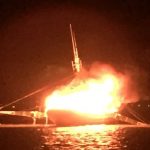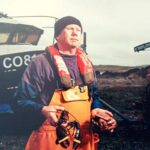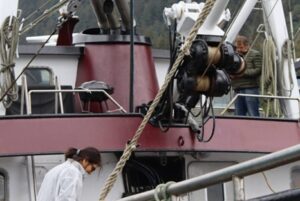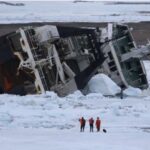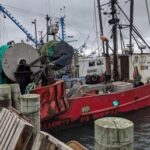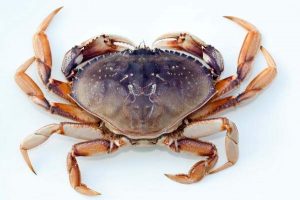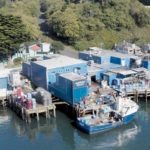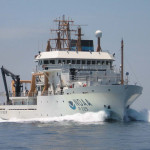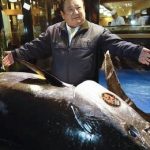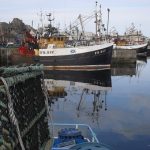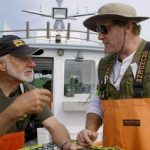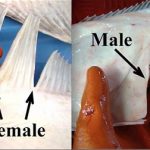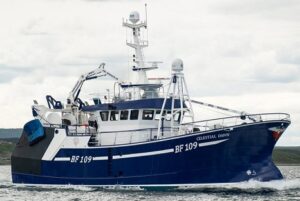Tag Archives: canada
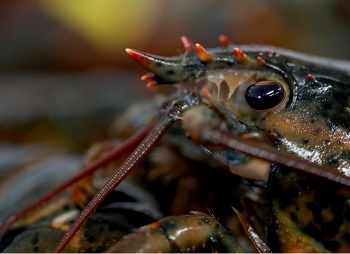
Are seafood wholesalers filling their pockets?
Where are the huge profits of seafood wholesalers going? Or the difference between the price paid to fishermen and the price charged to consumers, for example for crab and lobster? “It’s never easy to say who is pocketing the profits,” immediately replies Jean Côté, biologist and scientific director of the Association of Professional Fishermen of Southern Gaspésie. There are cases where there are no “staggering profits”, he insists. For example, Mr. Côté recalls that at the start of the lobster fishing season, the fisherman received $8 per pound for his catch and his displayed price in the supermarket was $8.77. >click to read< 10:41
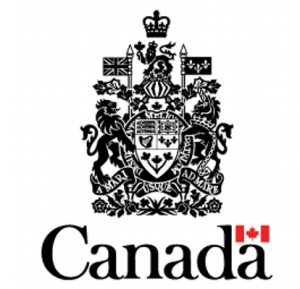
Commercial fishing deaths in Canada hit 20-year high
Despite improvements in safety training and awareness, commercial fishing remains one of the most dangerous professions in Canada. The Transportation Safety Board of Canada reports that 45 workers died between 2018 and 2020, the highest three-year total in 20 years. And fishing safety has been on the board’s watchlist of important safety matters since 2010. But fishing fatalities are preventable. The Transportation Safety Board also reports that 29 workers died between 2015 and 2021 after their boats capsized or sank without personal floatation devices or distress-alerting devices. “You’ve got to be prepared for the worst-case scenario, and that’s where we see that they’re not prepared,” said Glenn Budden. >click to read< 19:03
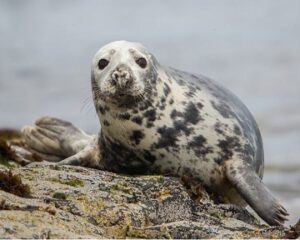
Why Canada shuttered some mackerel and spring herring fisheries in Québec and Atlantic Canada
The announcement by the Department of Fisheries and Oceans to suspend fishing for Atlantic mackerel and spring herring in the southern Gulf of St. Lawrence made waves as the fishing season opened. This decision will have repercussions on the fishing industry at several levels since these species are fished not only for commercial purposes, but are also used as bait in the lobster, snow crab and Atlantic halibut fisheries. The latest stock assessment of Atlantic mackerel and spring herring in the southern Gulf of St. Lawrence revealed high mortality rates among adult fish. In addition to high fishing pressure, the natural mortality of fish by predation also increased rapidly, The grey seal, now 16 times more abundant than in the 1960s, is the main predator of herring. >click to read< 18:38
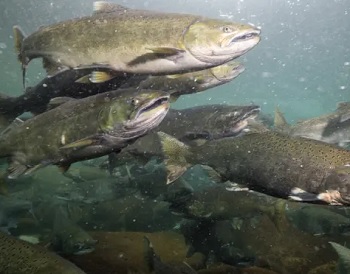
Canada ignored warnings of virus infecting farmed and wild salmon
Canada was warned in 2012 by its own scientists that a virus was infecting both farmed and wild salmon, but successive governments ignored the expert advice, saying for years that risks to salmon were low. Justin Trudeau’s government has said it will phase out open-pen industrial fish farms off the coast of British Columbia by 2025. But both his government and the previous Conservative government were in possession of a newly released report that linked large-scale farms and wild salmon to the highly contagious Piscine orthoreovirus (PRV). In 2012, biologists with the department of fisheries and oceans investigated the presence of the virus, which has been found in both farmed and wild salmon. but successive governments ignored the expert advice, saying for years that risks to salmon were low. >click to read< 11:48

DFO enacts new regulations aimed at depleted fish stocks
The Department of Fisheries and Oceans has enacted new regulations that bind its minister to rebuilding Canada’s depleted fish stocks and ensuring healthy ones stay that way, a move that comes weeks after it closed down two East Coast fisheries in the name of sustainability. The regulations are the teeth behind amendments to the Fisheries Act passed in 2019 and have been closely watched by the commercial fishing industry and environmentalists. The changes were posted Wednesday in the Canada Gazette. It identified 30 major fish stocks that will require a rebuilding plan,,, The minister for the department will have up to three years to produce a rebuilding plan once the stock has hit the limit reference point. >click to read< 16:32

The fisherman and the entrepreneur: How Canadians are helping in Ukraine
One is a Nova Scotia lobster fisherman who delivers supplies to frontline towns. The other is an entrepreneur from Toronto who enlisted in Ukraine’s foreign legion. Lex Brukovskiy and Igor Volzhanin might have different roles, but they are among many Canadians helping Ukraine respond to the Russian invasion. Canadians have been evacuating civilians from areas under Russian attack, housing refugees and keeping hospitals stocked with medicines. They have also been serving in Ukraine’s armed forces, both in combat roles and, like Volzhanin, as administrators. In downtown Lviv, a 34- year-old Canadian stood outside the national opera house wearing a camouflage jacket and an army green toque. “I was actually, in a way, pleasantly surprised that so many Canadians have come here,” to join the international legion, Volzhanin said. “They’ve come from all over Canada.” >click to read< 07:45
year-old Canadian stood outside the national opera house wearing a camouflage jacket and an army green toque. “I was actually, in a way, pleasantly surprised that so many Canadians have come here,” to join the international legion, Volzhanin said. “They’ve come from all over Canada.” >click to read< 07:45
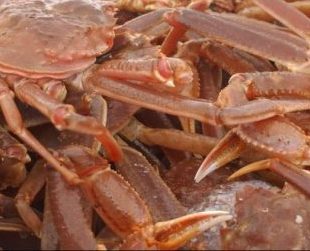
Political pressure for an early opening of the Gulf crab fishery
Quebec urges Ottawa to authorize the opening of the snow crab fishing season as soon as possible in the southern Gulf of St. Lawrence, in which crabbers from the Magdalen Islands, Gaspé and New Brunswick participate. In a letter sent on March 28 to his federal counterpart Joyce Murray, a copy of which was obtained by the QMI Agency, the Quebec minister responsible for fisheries, André Lamontagne, points out that the early opening of the snow crab fishery in the Gulf is, so far, “the most effective adaptation measure that reconciles the protection of Right whales and fishing activities”. >click to read< 10:17
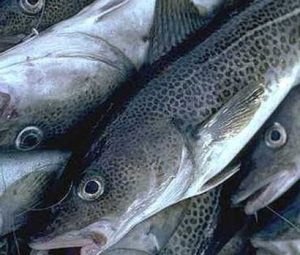
Canada and France reach agreement with total allowable catch rollover of 3Ps cod
Today, the Minister of Fisheries, Oceans and the Canadian Coast Guard, the Honourable Joyce Murray, announced that an agreement has been reached with France regarding 3Ps cod for the 2022-23 fishing season. Both countries intend to roll over the current total allowable catch (TAC) of 1,346 tonnes. Canada and France (in respect of Saint Pierre and Miquelon) co-manage fish stocks, including cod, in the 3Ps zone off the south coast of Newfoundland and Labrador. Under the Procès-Verbal Agreement, the two countries meet annually to negotiate management measures, including the TAC of these shared stocks in the North Atlantic. >click to read< 20:35
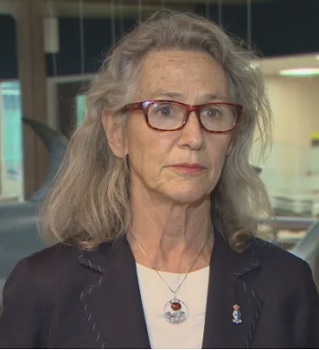
Immediate closure of herring and mackerel fisheries a broadside into coastal fishing communities
The Coalition of Atlantic and Québec fishing organizations questions the rapidity of the government decision and the lack of transparency in the science. “How do you go from a no closure to a closure situation without consulting commercial fishers,” said Martin Mallet, MFU Executive Director. “The 2021 stock assessment showed that the 4000t quota would enable recovery of the resource. This decision had been taken in collaboration with industry, and we were to revise the situation after the next stock assessment in 2023. Without consultation or even advance notice of a potential problem, DFO has slammed the commercial fishery.” This unilateral closure of the spring herring and mackerel commercial fisheries will have a major negative impact on the fishery since these fish are a significant source of bait for the lobster and snow crab fisheries. >click to read< 09:16
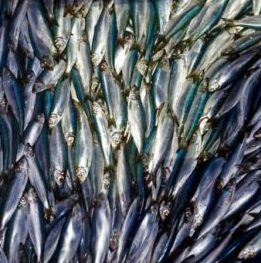
Bait Crisis: Lobstermen worry fishery closures will create bait supply issues
Last week, Fisheries and Oceans Canada shut down commercial harvesting of herring in the Gulf of St. Lawrence and Atlantic mackerel in Atlantic Canada and Quebec amid dwindling stocks. The two species are important sources of bait for the lobster industry. Some Island fishermen say they were caught off guard by the announcement as they prepare for setting day about a month from now. “It’s tough on fishermen because … we need the bait to fish lobster,” said Mallory Harris, who fishes in North Lake. Other fishermen said they’re already seeing the price of bait for lobster traps increase. >click to read< 08:14
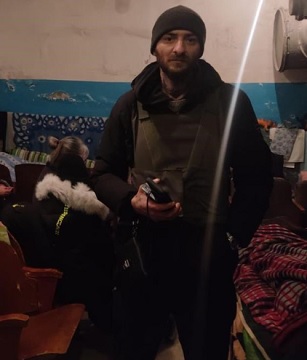
Canadian fisherman helping displaced Ukrainians escapes Chernihiv on foot amid Russian shelling
A Canadian who was trapped in northern Ukraine while attempting to assist displaced citizens has managed to escape the area on foot as bombs rained down. Lex Brukovskiy was stuck in the city of Chernihiv for five days before he was able to walk out on Tuesday, leaving his van behind as Russian shelling of roads and bridges continued. He said in a series of texts that once outside the city in eastern Ukraine, he continued to walk, hitched a ride and then eventually rejoined his original convoy of relief vehicles and reached the western city of Lviv on Thursday. Brukovskiy, a fisherman from Meteghan, N.S., who grew up in Ukraine, says the convoy of vans did rescue six displaced people, as several vehicles managed to get out of the city ahead of him. >click to read< 10:38
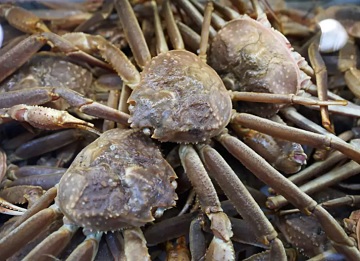
Snow crab prices skyrocket
The price of snow crab jumped last year. It explodes again this year. The price of the first arrivals of the season, which opened on Friday, exceeds $38 a pound for cooked crab in Montreal. Last year it was around $26. Enough for crab legs to stop being part of the springtime ritual for many Quebecers. At the Jean-Talon market, the price of live snow crab is $21.50 per pound. That of cooked crab is $38.50 per pound. This explosion can be explained by several factors: galloping inflation, which increases costs, particularly transport costs, the imposition of quotas on Alaskan crabs by the American government,,, There are practically no Alaskan crabs in the markets. The Russians, with what is happening in Ukraine, will not sell their crabs to the United States. >click to read< 08:35
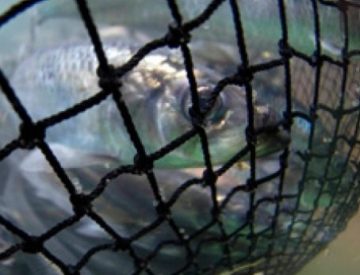
Ottawa announces closure of Atlantic mackerel, bait fisheries to restore stocks
Fishers on the East Coast are expressing their disappointment with Ottawa after DFO closed the Atlantic mackerel and commercial bait fisheries, citing concerns that dwindling stocks have entered a “critical zone.” The department said in a release Wednesday it was taking “urgent action” to help preserve the stock of southern Gulf spring herring and Atlantic mackerel with the closures in Atlantic Canada and Quebec. Fisheries Minister Joyce  Murray said she recognizes many harvesters depend on the fisheries, and she promised to work with them and others in the industry to preserve the stocks. Fishers in the sector, however, want the decision reversed. Martin Mallet, “It’s going to have a major impact — an atomic bomb impact — on our whole East Coast fishery, from Newfoundland to Quebec to southwest Nova Scotia,” >click to read< 18:52
Murray said she recognizes many harvesters depend on the fisheries, and she promised to work with them and others in the industry to preserve the stocks. Fishers in the sector, however, want the decision reversed. Martin Mallet, “It’s going to have a major impact — an atomic bomb impact — on our whole East Coast fishery, from Newfoundland to Quebec to southwest Nova Scotia,” >click to read< 18:52
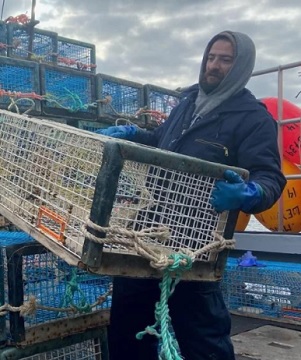
N.S. fisherman trapped by Russian shelling as he tries to drive Ukrainians to safety
A Canadian attempting to drive Ukrainians displaced by the war to safety says Russian shelling has trapped him in the city of Chernihiv for three days as food and water supplies dwindle. Speaking Friday from a bomb shelter in the badly damaged city in northern Ukraine, Lex Brukovskiy said he feels the shelling is an immoral tactic targeting innocent people trying to escape the conflict. “It’s dirty. It’s unfair because what the Russian army is doing is just taking civilians hostage,” said Brukovskiy, a lobster fisherman from Nova Scotia who travelled to his native Ukraine to offer help two weeks ago. “They’re not fighting army with army. They’re setting their army against regular people.” >click to read< 17:41

Higher Snow Crab Quota in the Southern Gulf of St. Lawrence in 2022
Due to Canada’s robust science and sustainable fishery management practices, the snow crab stock in the southern Gulf of St. Lawrence is healthy and is showing signs of continued health. For these reasons, the Minister of Fisheries, Oceans and the Canadian Coast Guard, the Honourable Joyce Murray, is pleased to announce that this year’s total allowable catch (TAC) for the Snow crab fishery in the southern Gulf of St. Lawrence will be 32,519 tonnes, up from 24,261 tonnes in 2021. >click to read< 15:01
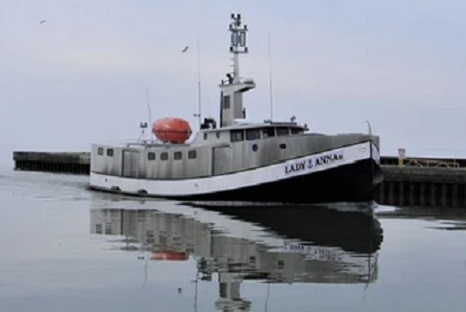
Commercial fishing out of Wheatley Harbour is like ‘farming on the water’
On a foggy March 9, I followed the 15-mile-long County Rd. 1, the Wheatley Road, due south from Tilbury. Except for two bends, that skinny ribbon of two-lane asphalt shoots arrow-straight and pancake-flat across the see-forever farmlands connecting Tilbury to Lake Erie’s north shore and to Wheatley, the world’s largest commercial, freshwater fishing port. So it was with Lady Anna II. I heard the low purr of a slow-turning diesel engine before I saw her. When I first spotted her, she looked like a small, grey box suspended over Lake Erie. And, before I knew it, her bow slicing the glassy-smooth water at a cruising speed of nine knots, Lady Anna II was at the mouth of Wheatley Harbour. >click to read< 22:00

What Canadians think of the Blue Economy
Fisheries and Oceans Minister Joyce Murray released findings Friday of an engagement process on its Blue Economy Strategy, which aims to make better use of Canada’s oceans for food production, energy and marine trade. Murray’s ministry consulted 1,600 Canadians to get feedback on its Blue Economy Strategy, which is designed to protect Canada’s oceans and maximize economic benefits from it. But one of the most important ocean-based industries in B.C, salmon farming remains under a cloud of uncertainty, with investments and hundreds of jobs at risk, as a deadline for renewing 79 federal licences looms. Murray offered no clarity on whether they will be renewed in June, which is when they expire. >click to read<, The Blue Economy-Who wants the disappearance of fishermen? The answers are here. >click to read< 19:17

Right whale protection measures to return ahead of migration into Canada
The federal government has announced its fishery and vessel management measures for the 2022 season to protect North Atlantic right whales as the endangered animals migrate into Canadian waters. Officials said in a statement Thursday the Fisheries Department will once again implement seasonal and temporary fishing area closures in the Gulf of St. Lawrence, the Bay of Fundy and other “critical habitat areas” where whales have previously been sighted. They also say Transport Canada is again enforcing vessel traffic measures, including speed restrictions for vessels over 13 metres long, throughout much of the Gulf starting on April 20 to better respond to right whale presence. >click to read< 08:29

Gulf of Maine: Lawsuits over North Atlantic right whale regulations coming to boil
Lobsterman Brian Cates lives so far at the edge of Maine he can look out the windows of his house and see Canadian boats out in Canadian waters. Cates and other New England lobstermen are worried about how the coming regulations issued by the National Marine Fisheries Service will affect their livelihoods. Cates fishes in disputed waters. There, around the mouth of the Bay of Fundy, there’s a strip of ocean claimed by both Canada and U.S. alike called the grey zone. Cates fishes up against Canadian lobstermen, their traps and lines often getting caught up on one another. And the rules coming down from the federal government are not helping, >click to read< 19:14
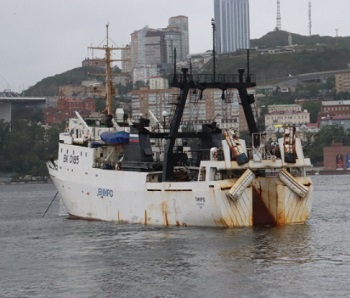
Despite Ukraine invasion, the U.S. and Russia are still working together to solve salmon mysteries
Tensions continue to simmer between Moscow and Washington in the wake of Russia’s invasion of Ukraine. In many respects, the divide between East and West is deepening: Oil companies are canceling partnerships with Russian firms. State legislators are calling for the state’s sovereign wealth fund to dump Russian investments. President Joe Biden announced Tuesday the U.S. would close its airspace to Russian aircraft. But the United States and Russia are continuing to work together on at least one issue: salmon. >click to read< 10:10
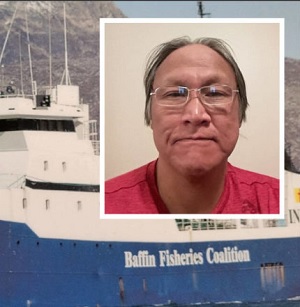
Making a living on the high seas
Fishing has helped sustain Inuit for generations. Commercial fishing has allowed Nunavummiut like Enoo Bell and Kyle Aglukkaq to earn a good living, although it comes with sacrifices. He’s been on hundreds of trips lasting from 15 to 25 days to harvest shrimp and turbot. He didn’t see his family for more than three months on one occasion in the early 1990s. “It’s hard to leave. Sometimes out there (you think), ‘Why am I here?’ On the other hand, his employer takes very good care of him and he’s pleased that Inuit have increasingly become rights-holders within the commercial fishing industry. His commercial fishing career has taken him to places like Greenland, Iceland, the Faroe Islands, Denmark, Norway and England. >click to read< 18:55

Canada Bans All Russian Ships from Ports – Newfoundland cod processor drops Russian imports
The government of Canada has joined the UK in banning Russian shipping from Canadian ports, adding to the growing list of penalties targeted at Russian commerce in response to the invasion of Ukraine. In an announcement Tuesday, three Canadian ministers announced that Russian-owned or registered ships and fishing vessels will be prohibited from entering Canada’s ports and internal waters. >click to read< – Icewater Seafoods of Arnold’s Cove cancels orders of Russian cod in show of solidarity with Ukraine – A major cod processing plant in Newfoundland and Labrador has cancelled all imports of Russian products, a move it describes as a sacrifice to show solidarity with Ukrainians. >click to read< 09:59

Demand is going to be strong! Remarkable snow crab season ahead for Gulf of St. Lawrence crabbers
The snow crab industry in the southern Gulf of St. Lawrence can expect an excellent 2022 fishing season, both in terms of catches and prices. The preliminary report of the most recent scientific assessment of the stock, carried out by Fisheries and Oceans Canada, shows a growth of 4% in the commercial biomass made up of males of 95 mm and over, compared to last year. It is now valued at close to 81,000 metric tons (MT). “We consider that we have a good breeding stock and that the stock is healthy,” >click to read< 09:14

Canadian lobster exports have biggest year ever, topping $3.2B last year
The value of Canadian lobster exports topped $3.2 billion last year, the highest ever and more than $700 million higher than pre-pandemic levels, according to new trade data. Soaring sales of Canadian frozen and processed lobster in the United States during 2021 accounted for most of the increase. “We had a very strong bounce back from the pandemic as people ate premium protein that they bought in grocery stores. They wanted healthy food, they wanted safe food and they wanted a treat. So they buy lobster,” said Geoff Irvine, executive director of the Lobster Council of Canada, an industry trade group. >click to read< 07:57
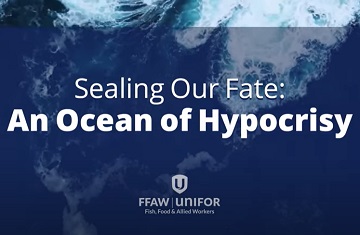
FFAW Launches Awareness Campaign on Seal Overpopulation
ST. JOHN’S, NL – The Fish, Food and Allied Workers Union is launching a nationwide campaign today to call attention to seal overpopulation in Atlantic Canada and the devastating effects on fish stocks. The Union representing fish harvesters is calling on the federal government to immediately undertake adequate scientific work to understand the true impact seals are having off our coasts, and to ensure appropriate action is taken to repair the ecosystem imbalance. Video, graphics, and a lot of information, >click to read< 16:08

FFAW “Shocked” by Federal Fisheries Minister’s Comments on Climate Change
The union says Minister Murray put forward her ideas and vision for the east coast fishery at the Canadian Independent Fish Harvesters Federation annual meeting. She outlined her goal to leave as many fish in the water as possible and to grow as much vegetation in the water as possible so that the Atlantic Ocean can better absorb carbon to combat climate change. She indicated that fish harvesters would have to accept the sacrifice as part of Canada’s commitment to fight climate change and noted that with technological advancements harvesters could change career paths and work remotely from their homes. >click to read< 08:29
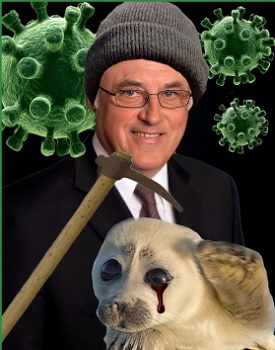
Ghost of seal hunt haunts Canadian trucker blockades over COVID-19 testing
Canadian cattle and pigs fed grain from the United States are going hungry. Some cattle and pigs en route from Canada to finishing and slaughter in the U.S. may be stuck aboard trucks. Behind the chaos lurks the ghosts of past political impasses over cod fishing quotas and the Atlantic Canadian seal hunt. What the long depleted Atlantic Canadian cod stocks and the nearly moribund seal hunt have to do with horn-honking truckers, cattle and pigs mooing and oinking with hunger pangs, and widespread public and political exasperation,,, You see where this is going, eh? >click to read< 19:36
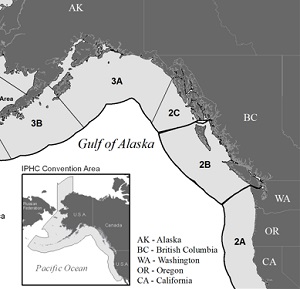
International Pacific Halibut commission raises most Alaska harvest limits for 2022
An uptick in halibut stocks along much of the Pacific coast means increases in total catch limits in every region of Alaska this year. The International Pacific Halibut Commission decided in its annual meeting last week to increase catch limits in every management region except for 2A, which covers the California, Oregon, and Washington coast, with an overall coastwide increase of nearly 6%. The increase comes after IPHC researchers informed the commission that halibut stocks were showing signs of rebounding from lows in the last five years, in part due to a large age class from 2012 becoming mature. The long-term trends of decline seemed to end in 2013, when the stocks began to climb again. >click to read< 14:37

Florida governor to investigate GoFundMe over Canada trucker donations
Florida Governor Ron DeSantis said on Saturday it was fraud for GoFundMe to “commandeer” $9 million in donations sent to support protesting truckdrivers in Canada and that he will investigate what he called “deceptive practices” by the website. GoFundMe took down the so-called Freedom Convoy’s page on Friday, saying it violated its terms of service. It said donors had two weeks to request a refund, then remaining funds would be disbursed to “credible and established charities.” >click to read< 11:44






